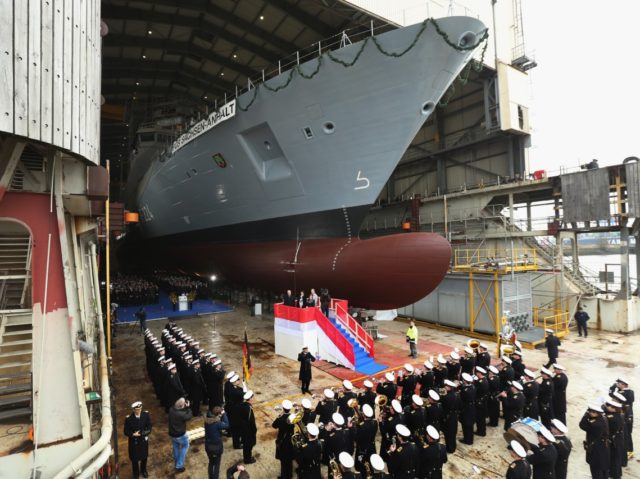The European Union has stepped closer to a fully operational army by announcing 13 new joint military projects, including a new fleet of next-generation warships, prompting condemnations of the EU’s “expansionist military ambitions”.
This week the European Union has announced 13 new defence projects, spearheaded by France, bringing the total number of joint EU army projects to 47. The new projects will fall under the command of the deeply controversial Permanent Structured Cooperation (PESCO) initiative, which was ratified by the bloc in 2017.
The new plans include a series of electronic warfare systems comprised of cyber training centres, an Airborne Electronic Attack (AEA) anti-jamming system, and a German-Czech project that could lead to the training of electronic warfare and military units in the future.
One noteworthy project is the development of a new class of warship, the European Patrol Corvette (EPC), a highly manoeuvrable ship smaller than a frigate but larger than a cutter. The new military ship will be developed in a joint venture between France’s state-owned shipbuilding company and the Italian owned Fincantieri. It is not known yet how many ships are to be built, according to Deutsche Welle.
PESCO will also undertake the development of the Maritime Unmanned Anti-Submarine System (MUSAS), a joint project between Portugal, France, Spain and Sweden aimed at providing an autonomous command structure for anti-submarine warfare.
The spectre of an EU army was once derided by Remain campaigners as a “dangerous fantasy” during the 2016 European Union referendum, however, the announcement of the 13 new military projects is another confirmation of the warnings made by Brexiteers for years of the European Union’s desire to develop a fully-fledged army, citing it as a reason why the United Kingdom should leave the EU.
“The Brexit Party is opposed to attempts to lock the UK into elements of the EU’s expansionist military ambitions”, a spokesman told The Daily Express.
“Voters want Britain to have an independent defence and foreign policy and if they put Brexit Party MPs in Parliament we can ensure this by holding Boris’ feet to the fire”, he added.
The new spate of EU army projects sees France taking lead, involved in most of them and spearheading three projects, one of which will work towards increasing “the ability of the armed forces within the EU to face collectively and efficiently the upcoming threats”.
Germany, on the other hand, will only be involved in two of the upcoming projects.
France’s President Emmanuel Macron said last week that “what we are currently experiencing is the brain death of NATO”, insinuating that the European Union needed an army to make up for the perceived lack of commitment from the United States under the leadership of President Donald Trump.
In response to the comments from Macron, Brexit Party Leader Nigel Farage said: “This is all wrong. I know Trump. He does not want to abandon NATO at all. What he says is that all the members should obey the rules and pay the two per cent contribution.”
Adding that “You can see with Macron, you can with Verhofstadt… any excuse to get rid of America and to build their own Walter Mitty European Army.”
In contrast to the claims of his critics, several key figures have praised President Trump’s approach to NATO as strengthening the alliance by encouraging its smaller members to become more enthusiastically involved, not least among them the Secretary General of the alliance Jens Stolenberg. Speaking in January, the NATO boss directly credited the President for the $100 billion more investment in the alliance being put forward by members, comments later echoed by the UK Prime Minister in June.

COMMENTS
Please let us know if you're having issues with commenting.